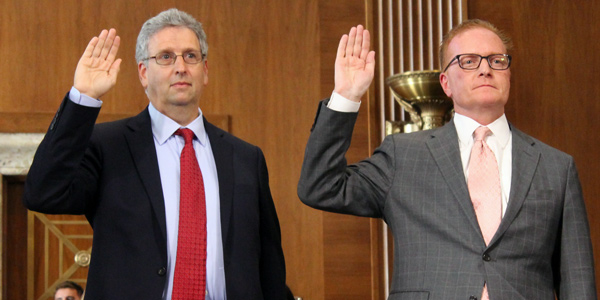By Michael Brooks
WASHINGTON — President Trump’s nominee for FERC chair brought little comfort to Republican senators seeking assurances that, under his leadership, the commission would look into shoring up uneconomic coal plants.
“FERC is not an entity whose role includes choosing fuels for the generation of electricity,” Kevin McIntyre, cohead of law firm Jones Day’s global energy practice, said at his Senate Energy and Natural Resources Committee confirmation hearing Thursday. “FERC’s role, rather, is to ensure that the markets for the electricity generated by those facilities proceed in accordance with law.”
McIntyre was responding to a question from Sen. John Barrasso (R-Wyo.), who asked if he agreed with acting Chair Neil Chatterjee’s belief that so-called baseload power — coal and nuclear plants — needed to be “properly compensated” to recognize their value to “reliability and resilience.” (See Coal Seeks ‘Resiliency’ Premium; FERC ‘Fuel Wars’ Coming?)
“I think, overall, the FERC’s role should be to take a hard look at these very important questions and determine where FERC’s jurisdiction actually gives it a role in making decisions that could ensure that there’s a proper attention to the reliability and resilience impacts of what is traditionally thought of as baseload generation,” he said.
Later, Sen. Angus King (I-Maine) urged McIntyre to “just go with the science” when it came to baseload generation, expressing concern that the term had become politicized.
“FERC does not pick fuels among different generating resources,” McIntyre responded. “And so it’s important that it be open to, as you say, the science, which I would expand somewhat also to include the characteristics of reliability and the characteristics of economics.”
The other nominee being considered for the commission, Richard Glick, echoed McIntyre’s position. He told Barrasso that a recent U.S. Energy Department study of the electric grid determined that the loss of baseload generation had not impacted reliability, “but they also suggested it was something to keep an eye on and look for in the future.”
“So I think both FERC and the Department of Energy need to keep an eye on it and continue to study the matter,” said Glick, currently general counsel for the Democrats on the Senate committee.
The committee devoted less than half of the two-hour hearing to McIntyre and Glick, as it also considered two nominations to the Interior Department: Ryan Nelson to be solicitor, and Joseph Balash to be assistant secretary for land and minerals management. The committee’s senators — some hailing from states with large swaths of federally owned land and sizable Native American populations, such as Alaska, Arizona, Nevada and New Mexico — had plenty of questions for the two Interior nominees about policies important to their constituents.
The two FERC nominees, on the other hand, found themselves declining to provide specific answers to many questions, citing ongoing proceedings and Notices of Proposed Rulemaking before the commission. Those questions covered issues such as price formation in energy markets, and eliminating barriers to distributed energy resources and energy storage.
Several Democratic senators asked the nominees about states’ rights in enacting renewable portfolio standards. After discussions with the Interior nominees about her home state, Sen. Catherine Cortez Masto (D-Nev.) asked McIntyre and Glick for quick, yes-or-no answers to her questions.
“Do you agree that states have the authority to establish the resource mix that best serves their customers?” she asked, to which the nominees responded in the affirmative.
She also asked if they agreed that renewable resources can be reliably integrated. Glick noted that several states get at least half of their electricity renewables and that none have had any problems.
“In part due to actions taken by the FERC, renewable energy resources are making their way reliably to our grid,” answered McIntyre.
Noting her state’s adoption of a zero-emission credit program, Sen. Tammy Duckworth (D-Ill.) asked if they agreed that states were “the appropriate place for these types of policies to be decided.”
“We do have a federal system of law,” McIntyre responded. “FERC has its role and the states have theirs, and there’s no question that the states have the absolute right to implement these renewable portfolio standards.”
Committee members refrained from addressing some of the more controversial issues brought up during the May confirmation hearing for Chatterjee and Commissioner Robert Powelson — such as climate change and the Public Utility Regulatory Policies Act. (See No Fireworks for FERC Nominees at Senate Hearing.)
Duckworth did ask about FERC’s role in securing a cleaner environment. Both nominees asserted that FERC is not an environmental regulator, while also noting that the commission ensures that clean resources have nondiscriminatory access to the markets and that it is seeking to better integrate DER, storage and demand response.
Committee Chair Lisa Murkowski (R-Alaska) told reporters after the hearing that she hopes to advance McIntyre and Glick to the full Senate “late next week.” Their confirmation would restore FERC to a full, five-member slate — which it has been without since the departure of Philip Moeller on Oct. 30, 2015.








